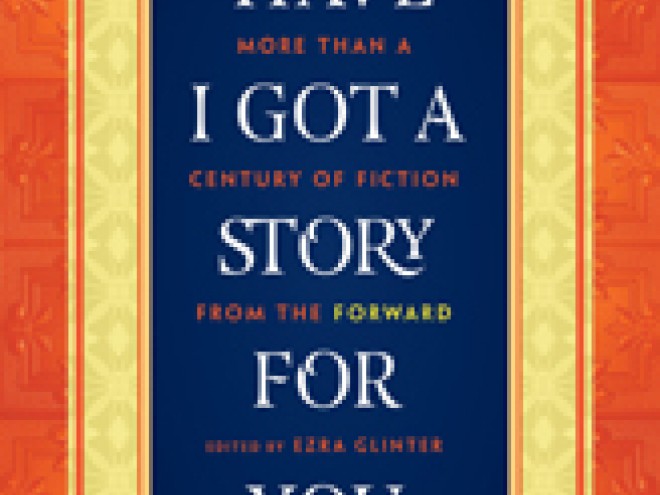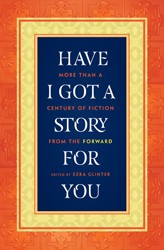Ezra Glinter is the editor of the new story anthology Have I Got a Story for You: More Than a Century of Fiction from The Forward, out tomorrow from W. W. Norton & Company. With the release of the book, Ezra is guest blogging for the Jewish Book Council all week as part of the Visiting Scribe series here on The ProsenPeople.
How do you go about putting together an anthology of fiction from the pages of a newspaper that’s been in continuous publication for almost 120 years? The Forward, as with other newspapers, once published literature every day: short stories, serialized novels, poetry, and much else. With so much material to choose from, where do you start?
That was the problem I faced when I began researching Have I Got a Story for You: More Than a Century of Fiction from The Forward. Fortunately, someone had already created the tool that I needed: a leksikon.
A leksikon, in Yiddish, is a biographical dictionary, often about writers or other literary subjects. Yiddish isn’t the only language to boast such publications — Japanese has the Biographical Dictionary of Japanese Literature, for example, while in English there’s the Dictionary of Literary Biography, which is some 375 volumes long. Yiddish Leksikonen aren’t quite so voluminous, but they have a venerable history.
The first major leksikon in Yiddish was the Leksikon fun der yidisher literatur un prese (Biographical Dictionary of Yiddish Literature and Press), a project spearheaded by the writer and editor Zalmen Reyzen. (Reyzen’s even more prolific brother, Avrom Reyzen, is one of the writers included in Have I Got a Story for You.) As Avraham Novershtern writes in the YIVO Encyclopedia, Reyzen’s leksikon was “a groundbreaking endeavor to present and systematize previously uncollected materials on Yiddish writers.” First published in 1914, the Reyzen’s leksikon was eventually expanded into the Leksikon fun der yiddisher literature, prese un filologye (Biographical Dictionary of Yiddish Literature, Press and Philology), which was published in four volumes between 1926 and 1929.
Yiddish literature didn’t stop then, however, and neither did its leksinonen. Between 1956 and 1981 the Congress for Jewish Culture published the Leksikon fun der nayer yiddisher literatur (Biographical Dictionary of Modern Yiddish Literature), a project that stretched to eight volumes and at least 7,000 entries. Melech Ravitch, a Yiddish writer and poet from Poland who eventually settled in Montreal, wrote his own leksikon, in which he offered appreciations of many writers he had known personally.
Leksikonen weren’t just about literature. One of the most important is the Leksikon fun der yiddisher teater (Biographical Dictionary of the Yiddish Theater), edited by Zalmen Zylbercweig between 1931 and 1969. That project stretched to six volumes (with a still-unpublished seventh) and some 2,800 entries, making it an indispensible resource for anyone studying the Yiddish theater.
Nearly all of these leksikonen were useful to me. But my first guide to researching Have I Got a Story for You was the Forverts leksikon — a leksikon devoted specifically to Forward writers.
Published in 1987, the Forverts leksikon was edited by Dr. Elias Shulman, a Yiddish critic and essayist, and Shimon Weber, the editor of the Forverts until his retirement, and then death, that year. Given its limited scope, the Forverts leksikon is a much smaller publication than some of its predecessors, reaching only 100 pages. But for me it was an indispensible resource. Before beginning any other work on the anthology the first thing I did was read the Forverts leksikon in its entirety.
From the leksikon I learned about many obscure writers who might not have come to my attention otherwise. It taught me about Rokhl Brokhes, whose story “Golde’s Lament” is the very first one in the collection. Other writers I first learned about from the leksikon include Roshelle Weprinsky, Yente Serdatsky, Lyala Kaufman and Miriam Raskin. While I was already aware of the big-name Forverts contributors, the leksikon made me conscious of their less celebrated but no less worthy colleagues.
The leksikon also gave me important tips about these writers’ careers — which works of theirs were considered the best, and when they were published. When it came towards the end of my work on the project, the leksikon provided valuable biographical information that helped me write the mini-biographies and notes.
While the Forverts leksikon is one of the more recent Yiddish biographical dictionaries, it is not the only new addition to the field. In 2011 the Congress for Jewish Culture published an additional volume to its previous leksikon of modern Yiddish literature. Edited by former Forverts editor Boris Sandler along with Chaim Beider and Gennady Estraikh, it focuses on Yiddish writers from the Former Soviet Union.
 There have also been efforts to translate the many leksikonen. The leksikon of Yiddish theater is being made available in English at the Museum of Family History website, while the leksikon of modern Yiddish literature is being translated and posted online at yleksikon.blogspot.ca by Josh Fogel, a professor of Chinese and Japanese history at York University. (You can read an interview with Fogel about his efforts at In Geveb.)
There have also been efforts to translate the many leksikonen. The leksikon of Yiddish theater is being made available in English at the Museum of Family History website, while the leksikon of modern Yiddish literature is being translated and posted online at yleksikon.blogspot.ca by Josh Fogel, a professor of Chinese and Japanese history at York University. (You can read an interview with Fogel about his efforts at In Geveb.)
Today the idea of compiling a biographical dictionary seems old-fashioned: All you have to do to research a writer’s life and work is Google them, or read their Wikipedia page. But as my research for Have I Got a Story for You taught me, leksikonen are still invaluable for researchers, especially when it comes to more obscure writers and subjects. Without them, I wouldn’t have known where to start.
Ezra Glinter is The Forward’s critic-at-large. His writing has appeared in The New Republic, Paris Review Daily, Bookforum, and The Walrus. His biography of the Lubavitcher Rebbe is forthcoming from Yale University Press.
Related Content:
- Quality Grumbling with Joshua Cohen and Justin Taylor
- Hannah S. Pressman: Yiddish and Me
- Alice Nakhimovsky and Roberta Newman: Nine Rules for Writing Jewish Letters
Ezra Glinter is the senior staff writer and editor at the Yiddish Book Center. He is the editor of Have I Got a Story for You, a finalist for the National Jewish Book Award. He lives in Brooklyn, NY.


